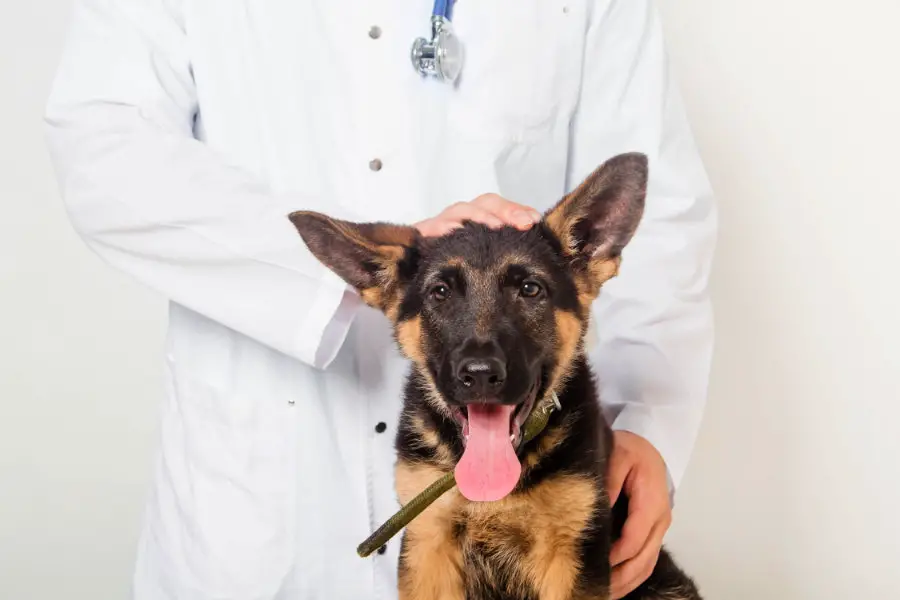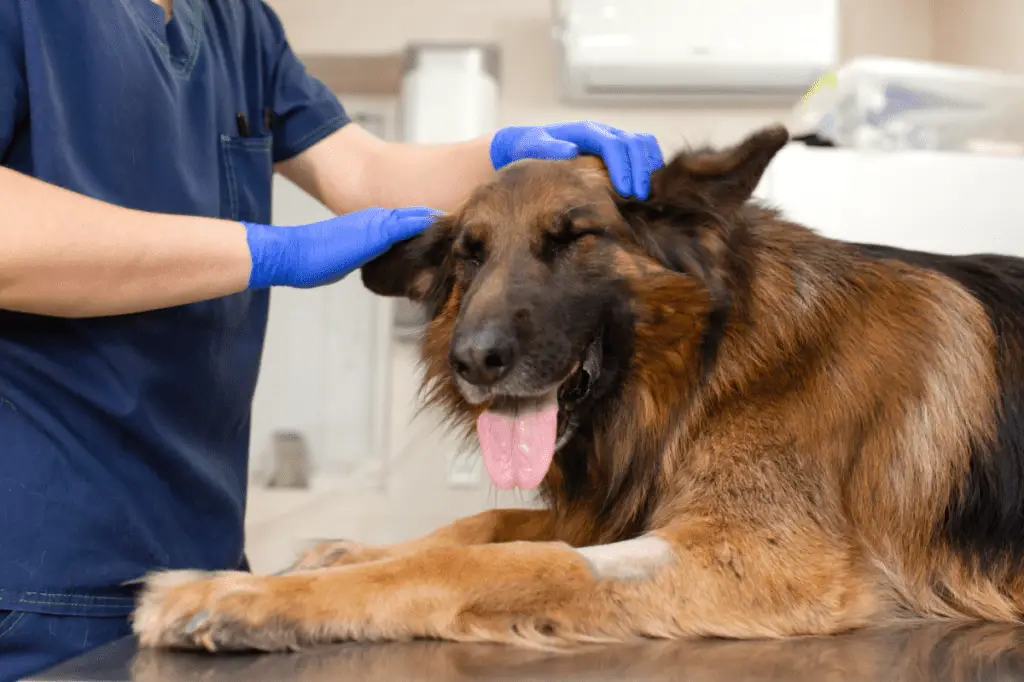Neutering or spaying a dog is one of the most common procedures to address hormone-related issues like aggression, restlessness, or a tendency to wander off. While it has many benefits, it isn’t free, and you’ll need to consider if it’s worth it.
The average cost for a standard neuter procedure (castration) in the United States can range anywhere from $50 to $500. Generally, local animal shelters or non-profit organizations tend to offer the procedure at a lower cost, while private veterinary clinics and hospitals, especially those in larger cities or more expensive areas, might charge more.
This article discusses what factors into the costs of neutering a German Shepherd, and other essential things you should know about the procedure.

What Exactly Is Neutering?
Also known as castration, neutering involves removing the testicles of a male dog, making the canine infertile. A veterinary carries out the operation.
On the other hand, spraying is a similar procedure in a female dog. It may involve removing ovaries and uterus, or any one of them, depending on the animal’s condition.
Making a dog infertile has many advantages, including less aggressiveness, better prostate health, breeding control, etc.
Why Does Neutering Cost So Much?
Depending on where you perform the surgery, the cost of neutering a German Shepherd can vary significantly. You can expect to pay more in a private vet practice, and less in a Humane Society or a non-profit clinic.
In some rare cases, you may have to pay more than $500, for example, if your dog is sick. It is very difficult to give an exact estimate since many factors affect the final costs.
Additional costs might include pre-operative blood work, pain medication, an e-collar to prevent the dog from licking or biting at the incision site, and follow-up visits to the vet.
Keep in mind that while neutering can seem expensive, it’s a one-time cost and can prevent future health and behavior issues, which can save on pet care costs in the long run.
Factors that Affect the Cost of Neutering A German Shepherd
The cost of neutering a German Shepherd, or any dog, can be influenced by several factors:
- Veterinary Clinic: Costs can vary significantly between clinics, with private practices generally being more expensive than animal shelters or nonprofit organizations that offer low-cost spay/neuter programs.
- Pre-operative and Post-operative Care: This can include blood tests, physical exams, anesthesia, pain medication, and post-operative check-ups. Some clinics bundle these services into the overall cost, while others may charge separately for them.
- Additional Procedures: If other procedures are performed at the same time, like dental cleaning or microchipping, this will also increase the cost.
- Complications: If complications arise during surgery, additional costs may be incurred.
It’s important to discuss these factors with your vet to get an accurate estimate of the cost and to understand what is included in the quoted price. Remember, while the cost can be significant, neutering is a one-time expense that can prevent various health and behavioral issues in the future.
Other factors that affect the costs of neutering your German Shepherd:
Age and Health of The Dog
Older or unhealthy dogs may require additional pre-operative tests and post-operative care, which can add to the overall cost. Puppies are generally cheaper to neuter because they are typically healthier and the procedure is often simpler due to their young age.
Older dogs take more time to recover from the surgery, meaning you may need to pay more for the pain medications. In addition, since young dogs are at fewer risk of infections, the castration can be conducted faster, so you’ll need to pay less.
Geographic Location
Prices for veterinary services tend to be higher in urban areas with a higher cost of living compared to rural areas. According to research, states including California, Hawaii, and Washington D.C. have the highest costs for animal healthcare. On the other hand, North Dakota and Arkansas have the lowest vet prices, which will also reflect in the prices for neutering and spaying.
Don’t forget that it’s difficult to generalize prices based on location since, even within a state, medical costs can be higher in major cities.
Size of the Dog
You’ll need to pay more if your German Shepherd is big or obese since it will need more surgical time. The same goes for pregnant dogs. As the blood vessels reaching their reproductive organs are bigger, the procedure should be conducted with more care.

Things You Will Need to Pay for While Neutering A Dog
It’s also helpful to know exactly what things you will be paying for:
General Examination
Before the surgery, the veterinarian needs to conduct a general examination of the dog, which involves examining its eyes, mouth, skin, palpitations, etc. The vet will also ensure that the animal is of healthy weight and the testicles are fine to go through surgery.
Blood Tests
Blood tests are on a case-by-case basis, and in some cases, you can decide if you want to do it or not. They are mostly conducted to know if the liver and kidney are fine and also help to find the best possible dose of anesthesia or sedation medication.
Sedation
A sedation medication slows down the brain activity of your german shepherd, allowing it to relax before the surgery. Since the German Shepherd is a big dog and can show some aggressive behavior if it feels threatened, heavy sedation is recommended before neutering.
Intravenous (IV) Catheter
An Intravenous (IV) Catheter is a flexible tube inserted inside the vein in one of the front legs of a dog. It is used to supply fluids that help to maintain the mutt’s blood pressure and to prevent dehydration during the surgery.
This is a very important step since decreased blood pressure during surgeries can affect the animal’s heart, brain, or kidneys.
Anesthesia
Anesthesia is a medication that makes your dog medically unconscious so that it doesn’t feel pain during the surgery. Bigger dogs need higher doses, so expect to have slightly bigger bills than those with small dogs.
Preparation for the Surgery
You don’t need to keep your dog in the medical facility before the surgery, but make sure you don’t feed it anything the night before. On the other hand, its hair needs to be shaved, and an antiseptic cream needs to be applied to avoid infections.
You need to pay for these two:
For the Surgery Itself
Well, this is a no-brainer. For the surgery, you’re essentially paying for the veterinarian’s skills and the tools needed, which include a scalpel blade, the surgical table, etc.
Post-Surgery Monitoring
To ensure that the dog is fine after the surgery, it must undergo another general health screening. This may include checks such as temperature, wounds in the incision site, mucus color, heart rate, etc.

Recovery
Your German Shepherd needs at least 2 weeks to recover completely after neutering or spaying. During that time, you will need to pay for essentials, including:
- Pain medications for up to a week
- Sedation medications if your dog is highly active
- Antibiotics if the surgical wound is at risk of infection
- Elizabethan collar (E-collar) to prevent the dog from licking in the surgical site
Final Checks
Finally, when the recovery time is over, you need to take your pet to the vet, who will conduct tests to ensure it’s healthy and can return back to its normal schedule.
Does Insurance Cover Neutering Or Spaying?
Unfortunately, most insurances don’t cover neutering or spaying.
As you can see, both of these surgeries are elective as they aren’t compulsory to guarantee a dog’s well-being. However, some pet plans can reimburse you for the procedures if it’s been verified by the vet that they were absolutely essential for the pet’s health.
Conclusion
There can a huge difference in the costs of neutering a dog based on where you conduct the procedure and the other factors discussed above.
If you’re looking for a budget option, go to a non-profit clinic. However, remember that there could be a lot of waiting time, and the services are limited to only neutering.
On the other hand, private animal clinics charge more, but they offer better aftercare and health inspections. But this can also depend on the particular facility.
